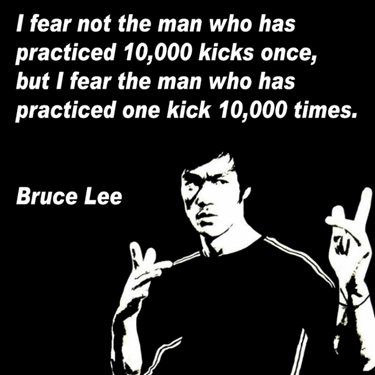“Repetition is the mother of skill” is a quote I picked up long ago from Tony Robbin’s “Awaken the Giant Within”. While I have read many Robbins literature and disagree with many ideals he preaches, this lesson stuck. Repetition of a skill improves that skill by making it sharper, more efficient and overall more automatic. Previously on this blog, we have explained before how willpower fades, and that you should not rely on it to pursue your goals. We proposed that one should rely on compounding, and repetitions are the pre-requisite to compounding. You can find that article here:
In this blog, we are going to outline the importance of repetitions, explain how you can use it to improve your business endeavors and explain why perfection is a hindrance to progression.
The importance of repetition
Jerry Uelsmann, a professor at the University of Florida, ran an experiment with his photography class. He split his class in half, with one side of his class being the “quantity” group and other side being the “quality” group. The quantity group would be graded solely on the number of photos they took (the more photos they took, the higher the grade). The quality group was only allowed to take one photo each and would be graded solely on the merit of that photo. Both groups were given the entire semester to produce their work.
At the end of the semester, the professor was shocked that the best quality photos actually came from the quantity group. While the quality group spent too much time pondering about the perfect photo, the quantity group was going out and taking lots of photos. In the process of taking many photos, they experimented, made mistakes, learnt new skills and therefore produced the best photos.
While the quality group deliberated, the quantity group were doing. The quantity group took photos daily and, in the process, repeated the skills they learnt. Photo after photo after photo, their skills grew and their experience accelerated. Meanwhile, the quality group spent too much time thinking about the idea of “a perfect photo”, and with no experimentation produced no exceptional work.
Perfection is the crutch to repetition
Sometimes we spend too much time spinning our wheels, and not enough time actually moving. We tend to look for the absolute best solution before actually solving the problem – this approach often leads to no action:
- Person A wants to lose weight, but he spends so much of time looking for the best weight loss program that he never actually does any dieting or exercise.
- Person B wants to become a great singer, but focuses more on dreaming about being a great singer than actually practicing bars or warm ups.
- Person C wants to start a business, but she wants the most efficient and advanced way of making money that she never gets to submitting a business plan.
Perfection is the crutch of repetitions, and thus a crutch of progress. With every start, there are going to be mistakes. Your first squat is probably going to be horrible, or first YouTube video is going to be filled with nervous sweats and stammering. That is acceptable. What needs to happen is that you continuously work on it, and you will definitely get better at it. Your 100th squat will always be better than the first. Perfection keeps you from starting, and starting is the most important thing to do.
How to apply repetitions to your business
Do more “business repetitions”: call more clients, involve yourself in more negotiations, make more sales, do more agile training. What you will learn along the way is many things that do not work and many things that do. Of course, a mentor can help you along the way. Remember however that we can only borrow knowledge and not action. Knowledge without action is worthless.
Going through the process of learning to fly while falling can be difficult. Customers may complain and sales may suffer, however the benefits of going through these challenges help to prepare your business should these occurrences happen again. Repetitions help you experience more such that your skills with improving sales, dealing with irate customers and reducing waste become crucial to business success.
All the greats perform repetition after repetition after repetition. Mike Bellafiore repeats “One Good Trade” over and over to grow his prop trading firm “SMB Capital”. David Beckham would practice free-kicks every day. Arnold Schwarzenegger put in many repetitions to become Mr. Olympia.
- Great chefs cook every day.
- Successful traders repeat good trades over and over.
- Ping-pong professionals repeat basic shots every day.
- Body builders perform countless repetitions to spark growth.
- Successful entrepreneurs repeat successful pitches over and over to grow their brand.

Closing thoughts
Repeat what you know to sharpen that skill. Repeat what you do not know so that it becomes what you know. Do not aim for perfection – it requires too much effort. Instead, aim for being very good many times. It is more sustainable and thus more lasting. It is acceptable to make many mistakes as it is part of the process to do great things.
What other experience do you have in developing skills? Let us know in the comments below.
About the author
Trishen Naidoo is the director of Pneuma Capital and co-director of Fulcrum Venture Capital (FVC). FVC have enlisted the services of Nikshen Consulting for business coaching and guidance.




